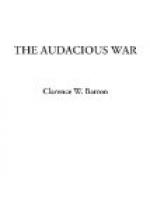For the United States to rush into the maelstrom of war, with organization of armies and the building of armaments, is to invite its own destruction.
For just one hundred years the North American continent has held the practical example of the impotency of the war-spirit where there is no war machinery.
By the Bush memorandum of agreement one hundred years ago it was provided that there should be no guns, forts, or naval ships on the greatest national boundary line of the world—4000 miles across the American continent between the United States and Canada. Nowhere else in the world have armed men attempted invasion, and yet provoked no war, no reprisal. What might have been the relations between the United States and Canada when the “Fenians” armed in New England and attempted a raid across the border, if there had been armies and fortifications on that border?
How securely now dwells in Canada $100,000,000 of the Bank of England reserve gold! When German representatives in the United States talk of Germany’s right to invade Canada and get that gold. Uncle Sam only smiles and frowns. And the smile and the frown are potential. That boundary has been consecrated to peace; and what would be thought of the proposal, did Germany command the seas, that Uncle Sam accept some money or promises to pay and permit the German armies to go through, according to the proposal to Belgium?
In an age which has abolished human slavery, broken the walls of China, which is bringing the yellow races into the labor and white light of civilization, which has made Germany a nation, and spanned a continent with the human voice so that Boston talks with San Francisco, is it too much to expect that it can bring the boon of an international civilization, abolishing national wars?
Indeed, it is right at our doors if the United States would only welcome it and join it, instead of preparing to invite the old-world barbarism of national warfare by planning military defenses and naval fleets.
Did anybody ever hear before of ten nations, and nearly a billion people, at war, and all declaring that they are warring for purposes of peace; and may there not yet be that universal peace by reason of this war, and the war’s alliances?
Suppose that, either before or after the nations of Europe lay down their arms, universal disarmament is assented to, and the peace of the world is entrusted to an international tribunal, which takes such part of the armies and navies as it may need to enforce its decrees, the balance so far as not needed for local police duty to be put back into industry or laid on the shelf, and all border fortifications ordered dismantled or turned into public recreation grounds—is it too much to expect in this Age?
What would be simpler than, in the end, to find fortified Heligoland, not back in the hands of England, but the naval base of a Hague Tribunal enforcing international peace?




